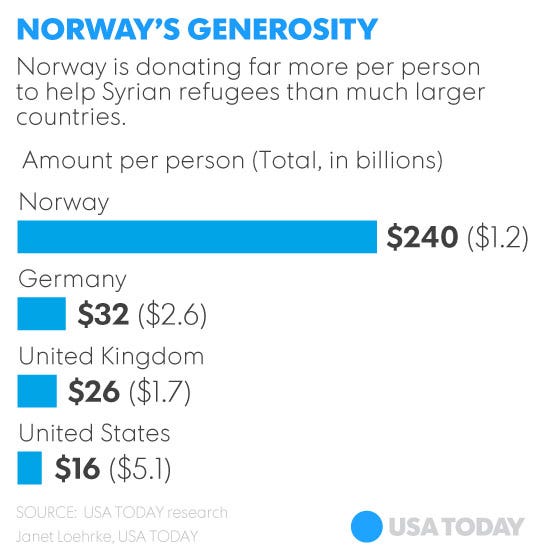Little Norway spends big on Syrian refugee crisis

OSLO — While Germany has grabbed most of the attention for its response to Europe's migrant crisis, little fjord-filled Norway has quietly emerged as one of the largest contributors of humanitarian aid to Syrian refugees.
The oil-rich Scandinavian country of 5 million has pledged $1.2 billion over the next four years for people who have fled Syria's nearly 5-year-old civil war.
That compares to $1.7 billion committed by the United Kingdom (population 65 million) and $2.6 billion by Germany (81 million) through 2018.
Based on population, Norway is donating $240 a person, compared with $26 by the U.K. and $32 by Germany. Since 2011, the United States (population 323 million) has pledged $5.1 billion in aid, or $16 a person.
Norway can afford to be generous: Its GDP of $97,000 per person is nearly double that of the U.S.
"Syria will need an educated population to get back on its feet when the war is over," Norway's Foreign Minister Børge Brende told USA TODAY. "The country’s future depends on political stability and social and economic development," he said.
Brende said that about 18 million refugees in Syria and neighboring countries, such as Turkey and Lebanon, are in need of humanitarian assistance. In addition to responding to their immediate needs, the money will be used to create jobs and support education.
Merkel holds talks with Turkey amid migrant drownings
"Norway has a long tradition for providing overseas aid," Brende said. "I believe that most Norwegians understand that it is important to continue to support the refugees."
Despite Norway’s spending, some critics complain that it's still not enough and that the nation is sending too much aid into the Syrian region at the expense of helping more refugees resettle in Norway.
“I wouldn’t call it generous,” said Jan Egeland, secretary-general of the Norwegian Refugee Council, a humanitarian organization with representatives in 25 countries.
“I would say (the funding pledges) are close to what you should expect from all countries with a strong economy and with a peaceful society. It’s not like Norway is doing more than it should. It’s the others who are not stepping up to the plate,” he said.
According to a "fair share" measure devised by Oxfam, the anti-poverty group, Norway last year contributed 385% of its allocated portion of an $8.9 billion funding appeal for Syria made by the United Nations and international Red Cross and Red Crescent groups. It was beaten only by Kuwait, which gave 554%. Germany donated 152%; the U.S. 76%.
For 2016, the international community has pledged $10 billion for Syria. Less than half of the 2015 pledge has materialized, according to the U.N.
Anti-immigration groups rally across Europe amid ongoing tensions
Linn Herland Landro, founder of the Refugees Welcome to the Arctic activist group, which is campaigning to stop the deportation of about 5,500 asylum seekers who crossed into Norway from Russia, said raising new funds for Syrians is a positive step. “At the same time, I find it problematic that they are not finding good solutions in Europe, and in Norway, for those seeking protection,” she said.
Landro's comments reflect a debate within Norway and elsewhere in Europe about whether it is better to send aid directly to Syria and surrounding nations or take in more refugees. Like many other countries across Europe, Norway has recently moved to tighten its asylum laws.
Egeland, from the Norwegian Refugee Council, said it was a false choice. "We have to do both," he said.
Just over 31,000 people — about a third of them from Syria — applied for asylum in Norway in 2015, according to the country's Directorate of Immigration. Nearly 163,000 sought asylum in Sweden, which has a population roughly double that of Norway. Germany took in 1.1 million migrants last year.
A European Union plan to redistribute 160,000 refugees across the 28-nation bloc as well as enlist Turkey to stem the flow of people trying to reach Europe has all but stalled.
Oxfam calculates that based on the size of its economy, Norway has admitted 260% of its "fair share" of refugees from the Syria region since 2013. Germany admitted 113%, Sweden 63% and the U.S. 7%, according to that measure.
"I think it’s very good that they give (direct) aid because they would probably most likely want to live in their own land and go to school there," said Stine Mari Flisen, a nurse who lives in Norway's capital, Oslo. "It is a lot of money we are talking about."
Reporter's notebook: Migrants settle in Austria
Hjelmgaard reported from Berlin
